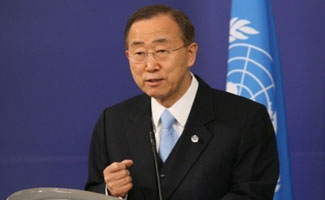UN chief Ban Ki-moon has invited Iran to a crucial peace conference on Syria this week after Tehran pledged to play a “positive and constructive role”, inviting objections from the US and threats from the Syrian opposition to pull out of the meeting. 
In an abruptly called press conference at the world body’s headquarters here yesterday evening, Ban said he “strongly” believes that Iran “needs to be part of the solution to the Syrian crisis” as he has been striving to generate momentum and create the “best possible atmosphere” for the success of the “crucially important” effort to end the Syrian war.
Ban said he has “spoken at length” in recent days with Iran’s Foreign Minister Javad Zarif, who he said agreed that the goal of the negotiations is to establish, by mutual consent, a transitional governing body with full executive powers.
“It was on that basis that Foreign Minister Zarif pledged that Iran would play a positive and constructive role” in the Geneva II Conference which begin Wednesday in Montreux, Switzerland.
Ban said Zarif assured him that Iran “understands that the basis of the talks is the full implementation of the June 30, 2012 Geneva Communique, including the Action Plan.
“Therefore, as convenor and host of the conference, I have decided to issue an invitation to Iran to participate,” Ban told reporters.
Following the announcement, Syria’s opposition said in a Twitter message that it would not attend unless Ban withdrew Iran’s invitation.
“The Syrian coalition announces that they will withdraw their attendance in Geneva 2 unless Ban Ki-moon retracts Iran’s invitation,” the Twitter message said, quoting Louay Safi, a coalition spokesman.
The US too expressed concern and said it views Ban’s invitation to Iran as “conditioned on Iran’s explicit and public support for the full implementation of the Geneva communique including the establishment of a transitional governing body by mutual consent with full executive authorities”.
Tehran had also refused to accept a communique adopted by the major powers in Geneva on June 30, 2012 calling for a transition government in Syria.
“This is something Iran has never done publicly and something we have long made clear is required,” State Department Spokesperson Jen Psaki said in a statement.
US also remains “deeply concerned” about Iran’s contributions to the Syrian President Bashar Assad regime’s “brutal campaign” against its own people, which has contributed to the growth of extremism and instability in the region.
“If Iran does not fully and publicly accept the Geneva communique, the invitation must be rescinded,” the statement added.
The US has long been skeptical of Iran’s intentions given that Tehran is among Assad government’s staunchest political and military supporters.
Ban said the issue of Iran’s participation in the Geneva Conference has been one of the key issues since 2012, when the first conference was held.
Former Secretary-General Kofi Annan was the convenor of the first conference and at the time it was decided “after very careful consideration” that Iran would not be invited.
The issue of Iran’s participation was again “discussed at length” when the Geneva II Conference was proposed.
“After long and very careful extensive discussion with the countries concerned, Iran needs to participate as one of the important neighbouring countries,” Ban said stressing that he has been assured by Iranian delegations that if the country is invited it will play a “very positive, constructive role”.
About 30 countries have been invited to Montreux for the opening day of the peace talks.
Syria’s government and opposition delegations will move to Geneva two days later to continue the deliberations mediated by United Nations special envoy Lakhdar Brahimi.
